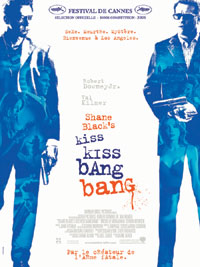 Shane Black’s new film, Kiss Kiss Bang Bang,
Shane Black’s new film, Kiss Kiss Bang Bang,
is one of my favorite this year. It’s like nothing I have seen in a
long time, the kind of movie that’s so much fun and has so much going
on that you can’t wait to see it again. It’s jammed to the edges of the
frame with amazing performances, incredibly snappy and stylized
dialogue and lots and lots of noir.
Robert Downey Jr plays a petty thief who accidentally gets involved in
Hollywood. Cast as a PI in a movie, he gets paired with a real private
dick to learn what that world is like. That PI’s name – Gay Perry – may
tell you a lot of what you need to know. Along the way, Downey and
Perry (played the inestimable Val Kilmer) find old flames, corpses in
showers, unravel conspiracies, lose body parts and generally get into
two-fisted trouble.
The film is Shane Black’s first directorial effort. He’s best known for his scripts for films like Lethal Weapon and The Last Boy Scout and The Long Kiss Goodnight,
but he’s been missing in action for most of the last decade (don’t
worry, I ask him about that). Last week he took some time to give me a
call, and we talked about the film, Hollywood, and screenwriting.
Q:
The film was a big hit way back at Cannes, and I saw the film months
ago – at the end of the summer. It’s been finished, and people have
been looking forward to it coming out, so why the delay?
Black: I
think, if I’m not mistaken, it’s because the studio liked the picture
and thought they might have something they could tack onto the
Christmas season. Now that’s what I was told. The wide release of the
picture is November 11th, so you’re already in territory where films
like Bram Stoker’s Dracula
opened. A lot of Christmas and holiday movies open at that time, and we
had never been seriously considered as part of that slate. I think it
was a combination of things – I think Tim Burton wanted to put out Corpse Bride earlier, and the studio said, ‘You know what? Why don’t we see if this Kiss Kiss Bang Bang picture can 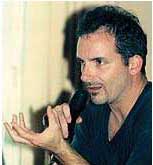 perform in November,’ against probably much stiffer competition than if it had opened in September.
perform in November,’ against probably much stiffer competition than if it had opened in September.
Q: Has there been any discussion that opening it then might lead to an Oscar push for best screenplay?
Black:
No, nothing like that. No one’s mentioned it. That’s pie in the sky.
I’d be delighted to make money, or to get some kind of accolade – but
who cares, you know? Ultimately I got the movie made and everything
else is gravy. I was talking to a Warner Bros executive who said that
the magic number on this picture was 30something. If it makes
30something, we’re going to throw a party. We’ll be thrilled.
Other
people are like, ‘Hope your movie makes a hundred million!’ No, dude,
dude, dude – 30. 35. Whatever, then I’ll throw a party because I’ve had
a hit movie and I’ll get another job, I get to do this again. It’s all
good.
Q: How was your
first time directing? I noticed that you did an interesting thing your
first time out and you hired two leads who have a history of being seen
as difficult to work with.
Black:
I just decided to dive in with both feet. I hoped that everyone trusted
me. There’s bound to be some skepticism, but I had a sense, this little
birdie in my head, telling that this is something I could do. I know a
lot about actors and acting, even if I’m not the best actor in the
world. I can certainly trot out a laundry list of tricks to basically
allow me to understand what an actor’s problem is when they’re talking
to me. I get their problem more than if I hadn’t studied acting.
I
didn’t worry about difficult people. If they were difficult I would
stand up to them and it turns out they weren’t. Now whether that’s
because of any skills I possess as a director or whether it’s because I
had this giant standing behind me in the form of Joel Silver, who
knows? I suspect it had more to do with the wrath of Joel, should
anything go down. But these guys were angels, Downey and Kilmer. I
don’t know what they’ve done in the past, I don’t know what they’ll do
in the future, I just know what they did on the set with me, and it was
– every day was inspiring. It was educational. I got completely jazzed
up by these guys, watching them take on the script. They conversations
we had when I would see them working on the character and I would
think, ‘Shit, I’m not talking to a movie star, I’m talking to a guy who
is doing his work. I’m talking to a craftsman.’ In that moment, yes
they were movie stars, but you could see them roll up their sleeves and
then again in those moments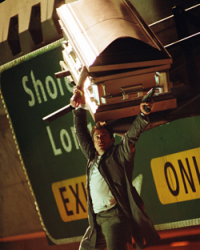
they’re like actors, any actor taking apart a script and doing their
job, doing their craft. It was so cool to watch movie stars at that
level, where they’re actually beyond being a star. They’re just doing
the work like everyone else has to.
Q:
You definitely get great performances out of them. I was impressed to
see Downey in his best performance in a long, long time. And he blew
Kilmer off the screen, which is incredibly hard to do. I mean, Val
Kilmer is such a magnetic performer but Downey went in there and made
every scene his own.
Black:
I agree. It’s not quite fair, because the film is weighted towards
Downey, he is the protagonist and I give him all the adorable moments
where you’re supposed to feel for him. Kilmer is pretty much the foil
and he doesn’t get those emotional moments in the script. But I
disagree that Kilmer gets blown off the screen, but I do agree that
Downey’s character has more to do than Kilmer’s.
Q:
One of the things that was interesting to me is that the credits say
that the film is based, in part, on a novel. Can you talk about that?
Black:
It’s like a meta-perspective thing. The movie is about these characters
who loved these private eye novels when they were kids and then grew up
and found themselves pitifully incapable of filling those shoes. What
looked so easy to the eyes of a child keeps slapping them down as
adults. They try to be tough, they get beat up. The main character
can’t even handle the tough guy narration; he’s fucking that up. The
guy who is the real tough guy ends up being gay. It was sort of that
feeling that these books inspired them but then when they were adults
things changed.
So
I needed a plot, a plot that was about real life, but then I also
needed a Johnny Gossamer-type plot that was bizarre and ridiculous and
could slowly encroach upon their reality. So I went back – here’s the
meta-perspective part – to the books that I read as a kid, and one of
them was written in 1941 and it was called Bodies Are Where You Find Them.
The part I took was the Johnny Gossamer plot about [spoilers redacted!
See the movie, damn it!]. It’s silliness, but because of my love for
those old books, and because I was paying homage to them, I thought why
not lift the plot from one of those old books and let that be the
Johnny Gossamer plot. It would be just like the books the characters in
the movie are reading. And then I added the part with the incest and
the red-haired girl, and the gay detective and all that new stuff, and
that would be the contrast.
Even
though it plays a relatively small part in the story, I’m pleased that
I was able to pay homage to Brett Halliday and the same books that led
me to think of Johnny Gossamer, and I might as well have called him
Mike Shane, which is the name of the detective in the Halliday books.
Q:
It’s been a couple of years since we’ve seen your work. How much of
that time away was because of all the media attention about your payday
for The Long Kiss Goodnight?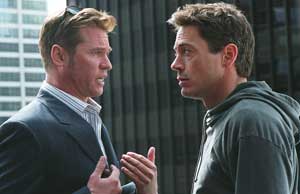 Black:
Black:
I didn’t like the attention. I tried to convince myself for a while, I
talked to myself and said, ‘You’re over-reacting, no one is paying
attention you. You’re the writer for Christ’s sake.’ Then one day I
said, ‘You know what? People are paying attention to me, and it’s for
all the wrong reasons.’ It was all about the money and about me and Joe
Eszterhas duking it out for the highest paycheck. That was all very
distasteful for me, I didn’t care for that. I didn’t want that sort of
attention. The money also led to problems, like losing friends over it.
Things like that.
I
got very disillusioned with Hollywood and I think I just wanted to step
out of whatever spotlight was on me and go somewhere where I was
invisible again, where I was safe. Of course I end up overcompensating,
you go too far and I go, ‘Fuck! No one is looking at me! I have to get
back on my feet and in the game again!’ And it took a while. It’s not
as though I stopped writing, but it took a while to find a script that
I liked that incorporated enough things in one movie where I would feel
like I had thrown in the kitchen sink. I didn’t want to make a tiny
little one note movie.
Q: What is it about screenplays and movies that keep driving you back there? Why not a novel?
Black:
Screenplays are a form that are very maligned and misunderstood. I
don’t know many novelists who have written them well. Some of my
favorite novelists have tried to do the screenplay adaptations of their
novels and failed abominably. I just think they’re two very different
things, and I respect novelists enormously. I have been lucky enough to
be given a certain level of competence at understanding a medium very
few people get. Screenwriting is very tough for novelists – it’s very
tough for most people. It’s a playful medium for me, because you’re
playing with images. Also, it’s a magic medium, because the end result
of it is something up on a screen twenty feet tall that speaks to
millions of people. So do novels, but movies are different, movies are
magic. Especially now that I’m starting to direct things, it’s too
tempting to pass up.
Q: Movies are also very collaborative, which I guess can be a positive and a negative. I mean, with Lethal Weapon 2 you had come to them with a very different thing where you had wanted to kill off Riggs in the end.
Black:
You want to get to the point where that bullshit goes away. I would go
back to writing novels if I couldn’t write a script without ten people
sticking their nose in it. I was very fortunate on this movie because
there was only one nose sticking in and that was Joel’s. I was lucky on
this movie because Joel and I think alike, and like the same things.
And because it was 15 million dollars, the studio said, ‘Joel, we’ll
trust ya. Just go and make the movie.’ So now I don’t have to go
through the development process, I don’t have to please the team of
experts, I have to please one man. Joel. And he and I see eye to eye
more often than not anyhow, so it was a dream. I got to do what was on
the page.
That’s what I mean when I say it’s a playful medium and it’s fun, I’m not talking about the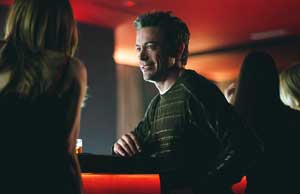 development process. Good God, no.
development process. Good God, no.
Q: So the film we’re seeing now is your vision.
Black: Yeah,
it’s the first time that what I wrote is on screen. I don’t mean to
malign the previous movies – sometimes they did things better than I
had envisioned on paper. There are things in the original Lethal Weapon
that are better than what I would have done. But for better or for
worse I take the blame on this one – if it’s bad, I’m bad. It’s what I
wanted, so if anyone doesn’t like it, I take the full brunt of it.
Q:
On the site I write for, CHUD.com, we have this big messageboard, a
very popular messageboard. Very often threads that are talking about
films you’ve written quickly become people trading back and forth their
favorite lines from your scripts. What is your favorite one-liner from
your work?
Black:
Oh God. I don’t know. It depends on the character. My favorite line is
one that was never published. It was talking about an old lady who had
witnessed a crime, he says, ‘Are you kidding, she’s an old bat. Her
glasses are actual Coke bottles. If she sees a mustache on a
Volkswagon, she’ll say “Gee that Omar Sharif sure runs fast.”’ Stuff
like that. I like quips. I can’t pick any one.
Q: Speaking of quips, one of my favorite things that I love in Kiss Kiss
is that scene at the bar where they’re going back and forth finding
people who sort of look like celebrities. The guy they pick out as
“Native American Joe Pesci” – I think about that and it cracks me up
still, a month and a half after I saw the movie. Is that something you
actually do?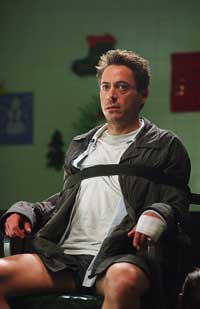 Black: Oh,
Black: Oh,
of course. I didn’t put any of them in the movie, but I play that game
all the time when I’m out. We lucked out. I showed up and we had a guy
who sort of looked like Steven Seagal, and that was it. I said,
‘Alright, obviously we have a bunch of extras and I looked through them
for three days now and I don’t see any that match the shit in the
script. Bald Kevin Costner, whatever.’ So I just stared at all the
extras, I just walked up and down the line staring at them. I looked at
him and said, ‘Native American… (he’s not even Native American, by the
way) and he kind of looks like Joe Pesci. OK, you stand over here.’ And
then I walked up and down and I saw one guy who looked sort of like
Billy Bob Thornton but looked like he was from Brazil. So I played the
game really fast, walking up and down the line of extras, an hour
before we shot. So man, did we luck out with that guy.
Totally have the hots for Michelle Monaghan on our message boards!